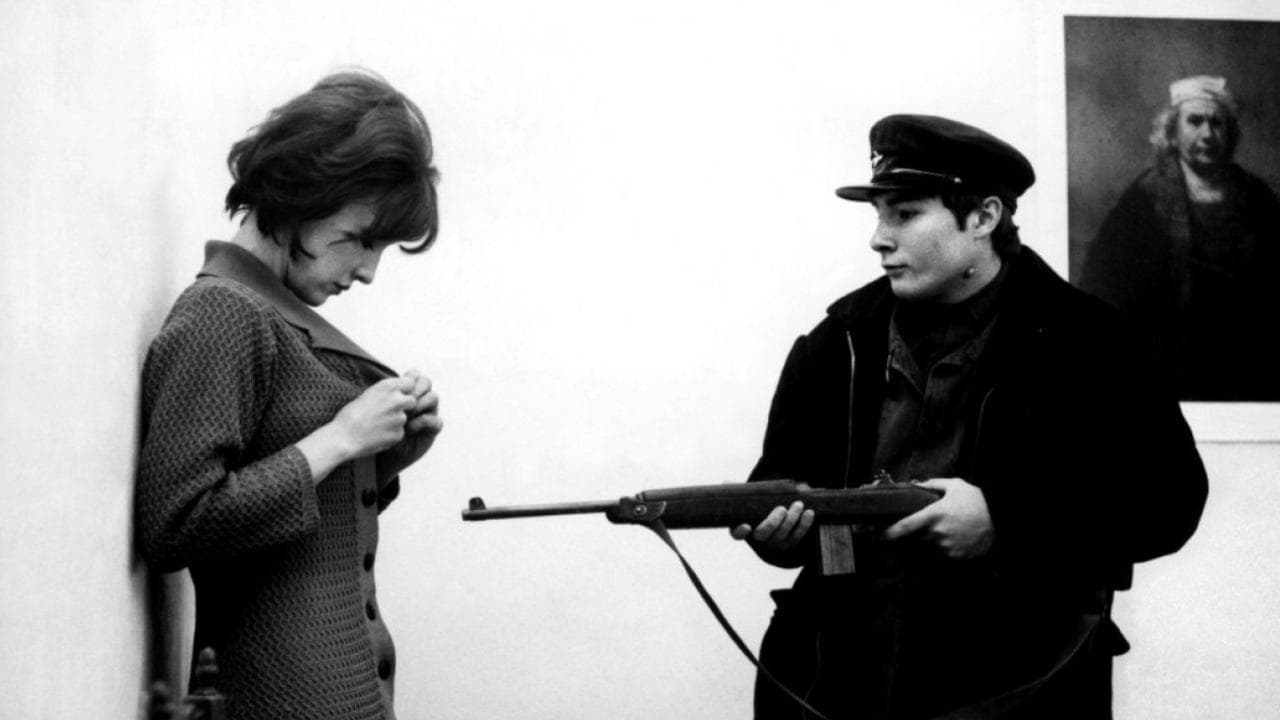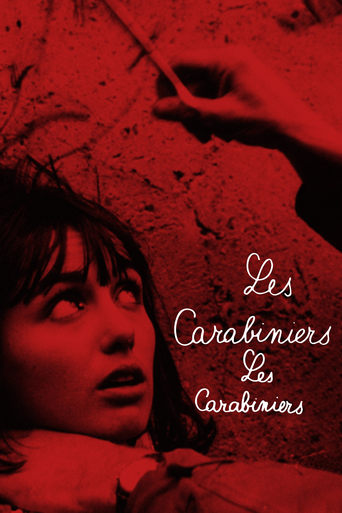

Very Cool!!!
... View MoreIt’s fine. It's literally the definition of a fine movie. You’ve seen it before, you know every beat and outcome before the characters even do. Only question is how much escapism you’re looking for.
... View MoreThe movie is wonderful and true, an act of love in all its contradictions and complexity
... View MoreThis is a gorgeous movie made by a gorgeous spirit.
... View MoreWhile watching Les Carabiniers it is immediately evident that Godard is making a statement in an individualistic way. Is it a satirical portrait of society at war, a black comedy poking fun at realistic drama, or an experimental project through which Godard exercising his right to redefine himself and his cinematic style? The film is undeniably a combination of all three. Two military officers arrive at a shack which, surrounded by barren land in every direction, is home to two men and their supposed wives. The officers blind the foursome with promises of riches and glory stating, "in the current times the police should learn to distract the population." The two men enlist and trot off to war, eager to "slaughter the innocent" and learn of "worldly women". A series of detached scenes ensues, illustrating the nature of war as the duo execute their plan to murder and misuse. Postcards arrive at home telling the women of their bloody exploits. The absurdity of war is made clear by the end of the film when the King loses the war, the men return home penniless, and life goes on much as it did before perhaps with a slightly more bitter tinge. While the film makes a political statement it is perhaps not as enjoyable to watch if one is not well versed in or highly admirable of Godard's work.
... View MoreCarabiniers, Les (1963) * (out of 4) Um, okay. Jean-Luc Godard film about two farmers who are picked by the King to join the war. The two aren't that interested at first but soon become very interested when they're promised that they can rape, murder, steal from and torture anyone they please since "that's what war is all about". I've seen plenty of anti-war film but there's no doubt this is the worst of the bunch. I'm going to go out on a limb and say this film is directed well since there's no way in hell, not even Ed Wood, could have made a film like this without it being on purpose. I wasn't shocked to learn that this film was bashed and bombed when it was first released in France only to gain popularity four years later in America. With all the anti-Vietnam stuff going on there's no wonder they ate this film up. The whole message was just downright stupid and if it was meant as satire then it didn't come off too well. The only nice scene is one where one of the soldiers goes to the movies for the first time. I wouldn't even call this thing technically well made like the previous film I watched. Compared to Paths of Glory this sucker is on the level of an Ed Wood film.
... View MoreOne of the main things to bear in mind when watching Les Carabiniers is the context in which the film was made. Le Mépris, widely regarded as Godard's finest film, was made in the same year 1963; and it is clear in Le Mépris how much time was spent to attain perfection in composition. So Les Carabiniers can be seen as something of an experiment a rough and ready look at one of life's grittiest subjects, war, a stark contrast to the passion of Le Mépris.The intertitles play a very important role in the film, both enabling communication between the soldiers and their wives and giving an important sense of passing time. The handwriting used gives a sense of personal feeling but at the same time the often short and factual text always addressed 'On', as if the feelings of both brothers can be captured in a few words, renders them highly impersonal. The other interesting quirk is the final intertitle being handwritten despite it clearly not being written by the brothers making it almost an epitaph.The cohesive device of postcards is important in the film, one is used to encourage the brothers to join, the postcards that are acquired by the end of their service are for them the riches of the world and the way in which they are thrown into the air makes them seem almost like the money they are seeking in a scene borrowed from heist films. Godard also uses the postcard collection to be a brief encyclopedia of the world through methods of transport, animals, monuments etc. ultimately trivialising it though into something only worth a few seconds of attention.The slightly broader device of images and art is seen throughout the film, the vanity in the wives created by the magazines is clearly frowned upon; their names Cleopatre and Venus clearly demonstrating what they aspire to. The excitement with which they greet the new magazines and subsequent humour when the underwear adverts are held up to their bodies demonstrates a clear disdain for the materialism which they encourage. The artwork that the brothers see in a house that they pillage however is treated with the utmost respect, and Michel-Ange utters the words "un soldat salut un artiste". This really means two things, that contemporary popular life contributes nothing to culture, and maybe a personal comment from Godard on the necessity of education in artistic appreciation.The anti-materialistic message can also be seen in the attitude of the wives, in encouraging their husbands to go and fight and in their reception of their husbands on their return, asking first of all where their treasures are.The mis en scene plays a very important role in the atmosphere of the film; the techniques used being almost the antithesis of the polished style of Hollywood. The camera is virtually never static and Godard appears not to have used a tripod on the whole even in the establishing shots, this gives the film a sense of realism and almost documentary style where the camera is following the action as it happens. The poor quality film stock adds to this, shunning both colour and resolution to give an unglamourous view of war.The editing of the film is also very unusual; some cuts seem to break down the continuation of relation that is understood in the grammar of cinema. One of the slightly odder examples is when Ulysses is seen in a medium close-up firing his rifle into the air there is then a cut to library footage of plane taken from another plane, and a quick cut back to Ulysses suggesting that he was firing at the plane when the images seem so clearly disassociated. Another example is when one of the carabiniers at the end of the film says "Je vais vous expliquer" in a shot where he can be seen with the two brothers in a medium shot, there's then an edit with a few empty frames and a close up of the carabinier repeating the same line. The sound is very often dubbed a few frames too soon or late and there is often no sound at all when ambient sound would be appropriate. The disjointed nature seems to be a distinct and deliberate effort to make the filming of war as brutal as possible.The reality of the war is something quite interesting and strange in the film as only two of the enemy soldiers are seen during the first 45 minutes of the film, there are however many seemingly innocent civilians harassed and killed. In fact the only time that actual fire fights are seen taking place is after the war is over for the two brothers and they are out to get their rewards, the only point at which they no longer have their rifles. The scene in which they are killed by one of the carabiniers suddenly reverses the contempt the audience has towards the brothers in that they have only signed up as mercenaries with no care to what they are doing, seeking to use to army to fulfill their material desires. It is then clear that in fact they have been used to satisfy the desire of the king, and this leaves a very bitter taste in the mouths of the audience.The film is however not entirely depressing, and the scene in which Michel-Ange discovers cinema is one of the most enjoyable. The film was described by one critic at the time a homage to Lumière's films, and while it can be seen in the visual style throughout the film, the short in which a train can be seen entering a station and provokes a reaction of fear from Michel-Ange is a more direct link. The scene in which he falls through the screen while trying to interact with the film, is something that anyone who has ever seen a film will understand and sympathies with, conveying a palpable sense of naivety.There are many quirks in the film that are never really explained but serve to illustrate the bizarre situations that war creates. The sequence with the Mexican woman, the fireworks display filmed in negative, the mysterious other man with the wives who scurries away upon the return of the brothers and the poem recited by the girl in front of the firing squad.Using a combination of humour, the march down the frozen river, and pathos, the newsreel footage of dead soldiers, Godard effectively conveys the reality and unreality of war and most importantly in the end how no one benefits.
... View MoreIf someone were to make a parody of the stereotypical French New Wave Film of the 1960's, Les Carabiniers would be it. I've read Godard has this supposedly great sense of irony, but I think he was dead serious with this piece of garbage.The film was on TCM last night, so I figured, hey it's Godard, I'll broaden my cinematic resume. I shouldn't have bothered. The badly overdubbed soundtrack, the cliched narration, the dumb poetry reading, the ham-fisted anti-war polemics, it was all there. The scene where the younger soldier sees a movie for the first time is quite funny, but the rest of the movie is interminable. The scene where the two soldiers return home with thousands of postcards for their wives (girlfriends, sisters?) seemed to take an hour. Godard's point is as follows: young people are duped into fighting wars by the government telling them they can steal and plunder the world, but in the end you wind up with nothing. Deep, real deep Jean.My rating, 3/10. For the cinefiles out there, see Godard's "Breathless" and then check Godard off your list and move on to someone else.
... View More